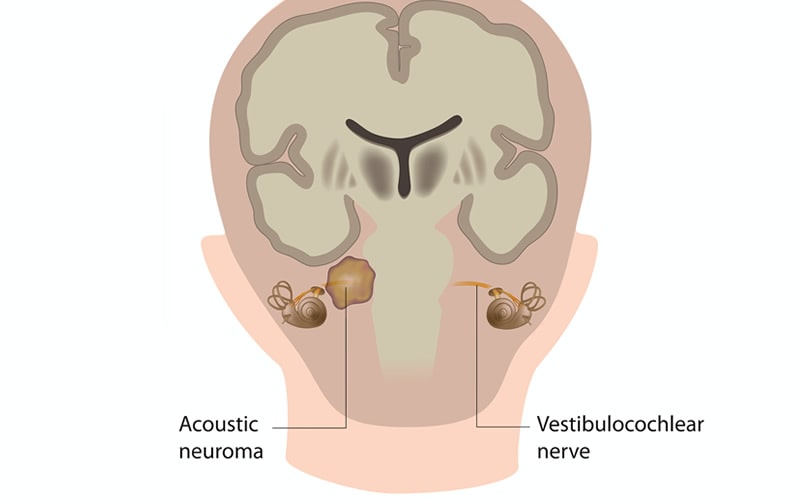Clinical presentation and Diagnosis

Patients with Acoustic Neuroma can present with a variety of symptoms. Symptoms often vary according to the tumor size.
Symptoms can include:
- Unilateral hearing loss
- Dizziness or disequilibrium
- Gait difficulties
- Tinnitus
- Ear pain
- Headache
- Facial numbness
- Facial weakness
- Hydrocephalus

Hearing Test
A hearing test is often the first test performed when a patient presents with symptoms that may be secondary to an Acoustic Neuroma. If there is an asymmetry in the hearing, in which one ear is significantly worse than the other, further evaluation is likely indicated. The hearing test is also critical to help determine the best treatment options. Residual hearing is important when deciding between the various options to deal with the Acoustic Neuroma. Patients may also present with other symptoms that can be secondary to Acoustic Neuroma. Patients with symptoms included on the list above may need further evaluation to assess for Acoustic Neuroma.

MRI
When patients present with symptoms that are consistent with Acoustic Neuroma, an MRI is often the diagnostic test of choice. High resolution MRI with internal auditory canal protocol enhances visualization of the tumor and the surrounding important anatomy. MRI is nearly perfect at identifying Acoustic Neuroma if one is present. In larger tumors, it is often helpful to utilize high tech imaging to trace the facial nerve pre-operatively. MRI with tractography can visualize the course of the nerve in the preoperative setting, allowing us to better anticipate and preserve the nerve during resection of the tumor. The Center for Acoustic Neuroma is one of the few centers in the world using tractography for visualization of facial nerve course on the capsule of the tumor.

Vestibulonystagmogram (VNG)
A vestibulonystagmogram (VNG) is a non-invasive test that assesses the function of the balance nerve and balance system. This evaluation is performed in our office and directly stimulates the balance cells within the inner ear to determine the amount of balance function that remains in the vestibular system. This test is important in determining normal function of the other side and assessing function of the affected nerve of balance. As the Acoustic Neuroma grows, it impacts balance nerve function on the side of the tumor. Many people with Acoustic Neuroma have little balance function disturbance because the tumor grows very slowly and they have compensation for the balance nerve loss on that side by the other unaffected inner ear balance system. In other words, the other side takes over the balance function and there may be no major disturbance in equilibrium. However, there are times that the Acoustic Neuroma severely affects the equilibrium, leading to a significant feeling of off balance or even vertigo.

Auditory Brainstem Response
An auditory brainstem response (ABR) is sometimes performed to assess the function of the cochlear nerve. This non-invasive test is performed in our office. The cochlear nerve is the hearing nerve that is intimately associated with the vestibular nerve, running alongside it from the brainstem to the inner ear. Assessing the flow of information along the cochlear nerve is sometimes helpful in determining the best treatment options for the tumor.
